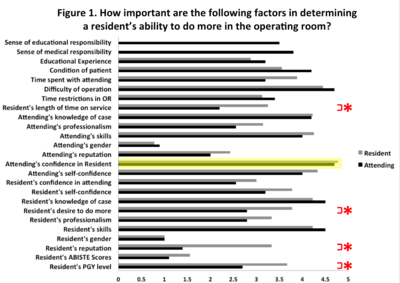Poster3 - 05: EVALUATING DIFFERING PERSPECTIVES OF ATTENDING AND RESIDENT PHYSICIANS IN FACTORS DETERMINING RESIDENT AUTONOMY IN THE OPERATING ROOM
Juyeon Park1, Sarah H Parker, PhD2, Shawn D Safford, MD, MAS1; 1Virginia Tech Carilion School of Medicine, 2Virginia Tech Carilion Research Institute
The Association of American Medical Colleges requires that resident physicians gain “graded, progressive responsibility for the care of patients” with proper supervision throughout their resident years. However in the last few decades, questions have been raised that graduate medical education policy changes have significantly affected resident autonomy. No study thus far has investigated the different viewpoints between attending and resident physicians in what is important to increase resident autonomy in the operating room (OR). Our objective is to investigate the differing perspectives between attending and resident physicians in factors determining resident autonomy in the OR.
A survey was distributed via email to resident (n=9, 37.5% response) and attending physicians (n=10, 35% response) at one institution asking what factors are important in determining resident’s ability to do more in the OR on a 5-point Likert-scale. Bivariate analyses comparing responses by attending and resident physicians was conducted using Wilcoxon rank-sum tests. Power analysis showed that this study needed a sample size of more than 8 samples per group based on an alpha of 0.05, power of 0.80, and difference in Likert-scales being 0.5.

By both attending and resident physicians, the highest rated factor determining a resident’s ability to do more in the operating room was the attending’s confidence in the resident (attendings: 4.70, residents 4.78, p<0.71, Figure 1). Residents perceived that their PGY level (p<0.0097), their reputation (p<0.0005), their desire to do more (p<0.038), and their length of time on the service (p<0.014) were more important than what attendings perceived the importance to be.
This study demonstrates that several factors were of importance to residents and attendings in determining when a resident is allowed to be more autonomous in the OR. Residents may believe factors they can affect like their reputation or desire to do more are important in affecting their autonomy, but attending physicians believe otherwise. A key factor not highly investigated yet is that of the attending’s confidence in the resident. The focus of surgical education should be refined to improve attending’s confidence in the resident as a possible intervention to increase resident autonomy in the OR.
